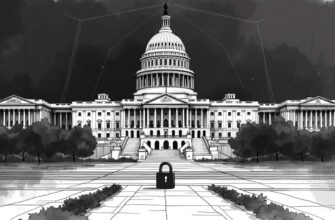China has rolled out its strict crypto regulations, and they are shaking things up on a global scale. The gap between China’s prohibitive approach and the US’s more flexible strategy is more pronounced than ever. Here’s a deep dive into how these regulatory frameworks are affecting markets worldwide, the risks associated with forcing transactions underground, and the ongoing struggle between innovation and regulation.
- The Regulatory Landscape
- China’s Tough Stance
- A Quick History
- What’s New?
- The US Crypto Regulatory Scene
- Who’s in Charge?
- What’s Happening on the Hill?
- Global Market Repercussions
- China’s Ripple Effect
- US’s Global Influence
- Global Implications
- The Risks of Underground Transactions
- The Transparency Dilemma
- Organized Crime’s Playground
- Tech Risks
- Compliance Evasion
- Impact on Legitimate Users
- Finding the Middle Ground
- The Positive Side
- The Negative Side
- Balancing Act
- Summary
The Regulatory Landscape
When it comes to crypto regulations, countries couldn’t be more different. Some are welcoming, while others are practically closing the door. If you’re in the crypto market, you’ve got to be aware of these varying regulations.
China’s Tough Stance
China isn’t playing around. Their latest regulations require local banks to keep tabs on high-risk transactions, particularly those tied to crypto, underground banks, cross-border gambling, and other illegal financial activities. They’ve declared all crypto-related transactions illegal, putting a serious damper on mainland investors looking to trade digital assets.
The Chinese government is all about shutting down private cryptocurrencies and possibly giving a thumbs up to state-backed currencies. The goal? Financial stability. But this also complicates things for investors inside the country.
A Quick History
They’ve had their foot on the brake for a while. Back in 2017, they banned ICOs and domestic exchanges to curb financial risks. By 2021, they took it up a notch with a full ban on crypto trading and mining. Technically, it’s still legal to hold digital assets, but the regulations are a mess.
What’s New?
Now, the State Administration of Foreign Exchange is demanding that banks monitor transactions involving digital assets more closely. They want to know about “risky foreign exchange trading behaviors”, including those tied to underground banking and crypto transactions. It’s a lot of work for banks: tracking who’s involved, where the funds are coming from, and how often trades happen. And yes, there’s also a push for banks to limit services to those entities.
The US Crypto Regulatory Scene
In contrast, things in the United States are a bit of a jumble. Various regulators like the SEC, CFTC, IRS, and FinCEN all have their hands in the crypto pie.
Who’s in Charge?
- The SEC is treating some cryptos like securities.
- The CFTC sees them as commodities.
- The IRS classifies them as property.
- FinCEN imposes anti-money laundering rules on the exchanges.
What’s Happening on the Hill?
They’re working on more comprehensive frameworks, like the Responsible Financial Innovation Act (RFIA), which aims to clarify the regulations around stablecoins and digital assets. With the potential shift from the SEC to the CFTC as the main regulator, we might see a more favorable environment for crypto.
Global Market Repercussions
China’s Ripple Effect
China’s draconian regulations have created massive hurdles for domestic investors and led to a notable drop in crypto trading within the nation. This has had global repercussions, impacting market sentiment and volatility.
US’s Global Influence
The US’s regulatory environment, on the other hand, is poised to provide clarity. Bills like the RFIA might bring stability and institutional acceptance through clear rules. A shift in regulatory oversight could also promote growth.
Global Implications
When it comes to global crypto regulations, the aim is to address investor protection, financial criminality, and market volatility. Regulations meant to stabilize the market, prevent financial crime, and protect consumers will likely influence cross-border transactions and investor sentiment. While regulation can be seen as a hindrance, it can also enhance credibility and promote institutional acceptance.
The Risks of Underground Transactions
Strict regulations can push users into underground markets, and that’s a breeding ground for illicit activities like money laundering and cyber fraud.
The Transparency Dilemma
Having transactions underground means no central monitoring, making it difficult for law enforcement to track suspicious activities.
Organized Crime’s Playground
Underground transactions can empower organized crime. In East and Southeast Asia, for instance, online casinos have become a favorite for money laundering operations.
Tech Risks
These underground spaces often lack the necessary tech infrastructure, making them susceptible to hacking. This could lead to trading platforms collapsing and significant losses.
Compliance Evasion
Overly tight regulations can drive users to find ways to evade compliance, pushing legitimate users into the shadows alongside criminals.
Impact on Legitimate Users
This is a tough spot for legitimate users. They may be forced out of the regulated space, losing the protections it offers, stifling innovation, and hampering market growth.
Finding the Middle Ground
Blockchain can function under strict regulations, but the nature of those regulations matters a lot.
The Positive Side
Clear regulations can build confidence and guide the market, improving consumer protection.
The Negative Side
But overly rigid regulations can hamper innovation. Old-school regulation can be costly and might lead to regulatory capture.
Balancing Act
Blockchain needs a middle ground that allows innovation to flourish while protecting consumers. Collaborations like sandboxes, and using RegTech can help. International cooperation is also key, given the cross-border nature of blockchain.
Summary
As we watch these two giants in the crypto regulation landscape, it’s clear that their approaches will have lasting effects on the global market. China’s prohibitive regulations create challenges, while the US’s fragmented approach seeks to balance growth with protection. The future remains uncertain, but these dynamics will undoubtedly influence the ongoing evolution of cryptocurrencies and blockchain technology.








